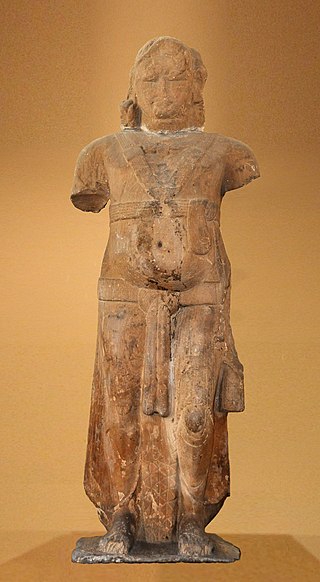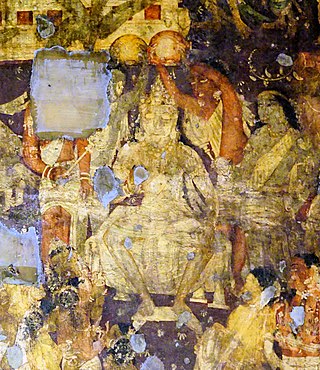Yakkha may refer to:
- Yakkha people, an ethnic group of South Asia
- Yakkha language, a Sino-Tibetan language
- Yaksha, also known as yakkha, a class of spirits in South and Southeast Asian cultures
Yakkha may refer to:
Indian or Indians may refer to something or someone of, from, or associated with the nation of India or with the indigenous people of the Americas.
Slavic, Slav or Slavonic may refer to:
Korean may refer to:
Bengali or Bengalee, or Bengalese may refer to:
Hindustani may refer to:

Vaiśravaṇa or Vessavaṇa, is one of the Four Heavenly Kings, and is considered an important figure in Buddhism. He is the god of warfare and usually portrayed as a warrior-king.

The Yakshas are a broad class of nature spirits, usually benevolent, but sometimes mischievous or capricious, connected with water, fertility, trees, the forest, treasure and wilderness. They appear in Hindu, Jain and Buddhist texts, as well as ancient and medieval era temples of South Asia and Southeast Asia as guardian deities. The feminine form of the word is yakṣī or yakshini.
Yaksa or Yaksha may refer to:

Yakkha is an indigenous ethnic group from the Indian subcontinent, mainly in modern-day Nepal and present-day India. It is one of the descendants of Nepal's prehistoric Kirat dynasty. The Yakkha people are subsistence farmers who inhabit the lower Arun valley in eastern Nepal. They number only a few thousand and their language is nearly extinct.
Yakkha is a language spoken in parts of Nepal, Darjeeling district and Sikkim. The Yakkha-speaking villages are located to the East of the Arun river, in the southern part of the Sankhuwasabha district and in the northern part of the Dhankuta district of Nepal. About 14,000 people still speak the language, out of 17,003 ethnic Yakkha in Nepal. Genealogically, Yakkha belongs to the Eastern Kiranti languages and is in one subgroup with several Limbu languages, e.g. Belhare, Athpare, Chintang and Chulung. Ethnically however, the Yakkha people perceive themselves as distinct from the other Kiranti groups such as Limbu.

According to the Mahāvaṃsa chronicle, Prince Vijaya was the first recorded King in Sri Lanka although there is no archaeological evidence proving this. Legends and records from both Indian and Sri Lanka sources say that he along with several hundred followers came to Sri Lanka after they were banished from Sinhapura.
Yakka or yacka may refer to:
Yaksha is a name of several nature-spirits in Hindu and Buddhist mythology.
Myanglung is a municipality and the district headquarters of Terhathum District of Koshi Province in eastern Nepal. The municipality is situated at an elevation of about 1500 metres above sea level. Myanglung was converted into a municipality from a village development committee on 18 May 2014, merging the existing village development committees of Myanglung, Piple, Jirikhimti, Ambung, Sabla and Tamphula. According to the census of 2011 the total population of Myanglung is 19,659 including five VDCs.
Chainpur is a municipality in Sankhuwasabha District in the Koshi Province of north-eastern Nepal. It was formed by merging five villages i.e. Chainpur, Siddhakali, Siddhapokhari, Baneshwar and Kharang. The municipality was implemented on 18 May 2014. At the time of the 1991 Nepal census it had a population of 4933 people in 948 households.
The Kiranti languages are a major family of Sino-Tibetan languages spoken in Nepal and India by the Kirati people.
Yaka may refer to the following languages of Africa:

Dewa people were one of the four main tribes of ancient Sri Lanka who predated the coalition of Sinhalese nationality. Sinhalese people are an Indo-Aryan ethnic group of the island of Sri Lanka. They were historically known as Hela people, Ceylonese islanders, and Sinhalese islanders. They constitute about 75% of the Sri Lankan population and number greater than 16.2 million. The Sinhalese identity is based on language, cultural genetic heritage and nationality. The Sinhalese people speak Sinhala, an insular Indo-Aryan language, and are predominantly Theravada Buddhists, although a minority of Sinhalese follow branches of Christianity and other religions.
Bangla may refer to:
YBH or ybh may refer to: